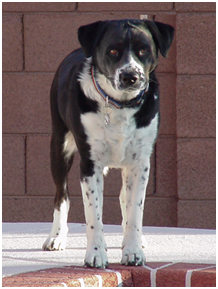 For 15 years I had a rescue dog. Most likely, you do not. You probably have a surplus dog. Surplus dogs are in shelters and most often incorrectly-identified “rescue” organizations. They exist because there are not enough homes to go around. Rescue dogs are at risk of tangible and immediate injury and death unless someone…here’s the appropriate word…rescues them. That’s how I met Splasher.
For 15 years I had a rescue dog. Most likely, you do not. You probably have a surplus dog. Surplus dogs are in shelters and most often incorrectly-identified “rescue” organizations. They exist because there are not enough homes to go around. Rescue dogs are at risk of tangible and immediate injury and death unless someone…here’s the appropriate word…rescues them. That’s how I met Splasher.
He had fallen in one of the large irrigation canals that lace the greater Phoenix area and was in the process of drowning. The walls of these canals are steep and made of rough concrete. Crawling out of one is impossible for a dog and I could see blooding marks on the far bank to show where this dog had ripped his nails in a futile effort to get out. I decided to help him. I had my dog Tuggy with me who was recovering from surgery and not in the best of shape. So I un-slipped his leash and made a wild-west lasso out of it. I got on my belly and called the dog. He didn’t  want to have anything to do with me. He was a street dog. Look at those piercing eyes. He kept circling in the current.
want to have anything to do with me. He was a street dog. Look at those piercing eyes. He kept circling in the current.
You can’t see it from the photo of the canal, but there is about a 3 MPH current going toward a set of gates. If you drift to the gates you die. The pressure of the water will shove you against the large steel grates and you will be pinned until someone drains that section of canal. A police scuba diver died that was a few years ago. I pulled quite a few critters out of this canal, including my 50-ish year old autistic neighbor who damn near drowned. After shoving my neighbor on dry land I got myself out. My leg looked like hamburger from where it barely brushed the concrete canal wall. Then it got infected. These canals may look tranquil, but they are very dangerous.
So, I decided to pull him out. After all, I’m an ex-dog catcher and have rescued hundreds of animals – real rescue. I “dabbed a loop” over his head as he passed by me and hauled him out. He had a big gash on his upper fore-leg and he yelped and tried to bite me as I yanked him to dry land. He didn’t “kinda” try to bite me when I pulled him out, it was a genuine big-boy bite. It didn’t land because he was exhausted and it wasn’t my first rodeo by a long shot. Now that is a rescue – you put yourself at risk to save a dog who thanks you by trying to take a hunk out of you. Merely getting a dog from a shelter or group that finds homes for unwanted dogs isn’t. It is simply a different way of getting a dog – like finding a used Styrofoam cup in a bush rather than a dumpster.
The first thing to appreciate when discussing surplus dogs is that each year, about 60% of dogs die before their first birthday. Humane groups doctor the numbers to imply that the overall problem is less than it is and that they do more than they do. This helps them get donations. If people really knew that shelters only adopt out about 40% of their animals, people would realize that shelters do nothing to influence the over-population problem. Worse, only about 40% of the at-risk animals make it to shelters. A major pet food chain crows that they have facilitated two million adoptions in twenty years. During that 20 years, about a billion dogs and cats died. Two million over that length of time is chump change.
If you are wondering why my numbers don’t match the ones from the national humane groups, it’s simple. I use the Pet Food Institute and other sources that make money selling data to businesses. If they are wrong, they lose clients. They have lots of clients. Their stats indicate that in the 25 years between 1981 and 2006, the population of dogs and cats rose from about 100 million to 140 million. That is a 40% increase in 25 years. So much for spay/neuter and all those rescue groups across the country. This is a serious point. All of the billions of dollars spent on “controlling” pet overpopulation have been completely ineffective at actually controlling the problem. The numbers are still growing.
The cold facts of this are simple. Rescue doesn’t stop or reduce overpopulation. Saving an animal does not create a new home. Eventually, every community reaches a saturation point where there are no more homes other than by attrition. If you find a home for a dog, someone else won’t. It’s all one big sea of animals needing homes. I can’t take a cup of water from your part of the ocean and deposit it in my part of the ocean. It’s all the same body of water. If a rescue group adopts out a dog, the county pound will adopt out one less. If a slow-kill shelter makes and adoption, the local will-kill shelter has to euthanize one more dog. In the face of this rather dismal reality you might decide that it’s futile to rescue dogs. I don’t think so.
The logical way to deal with this problem is to stop supporting rescue groups and become one yourself – a rescue group of one. If you choose to interfere with a dog’s life, do it right or don’t do it at all. The majority of real rescues in this country are done by individuals in vet clinics, kennels, grooming salons and private homes. They don’t have overhead, staff or fundraising efforts.
A very prominent East-coast humane group recently hit the internet and television with a media blitz. They imply that your donation will help animals locally, but they only have one shelter, in a major metropolitan area. My sources say that this group made $31 million off the campaign and donated $25,000 to shelters other than their own. Meaning, they sucked funds from local communities to feather their own nest. Those communities will have that much less money to rescue dogs, locally. My advice is to never give charitable money to anyone whose hand you haven’t shaken. If you keep it local and small, you will do better work. As a dog lover, you’re likely often bombarded with requests to save an animal. The bottom line is that if you aren’t willing to go the distance with any animal you assist, you run the risk of simply passing an animal from the frying pan to the fire. Once they leave your control, anything can happen and most of it is bad. Try to learn how to say no to people who want you to relieve them of their duty to their animal. It’s not your job.
When I hauled Splasher out of the canal, he cost me about $2,000 the first month. He was literally as sick as a dog. I did whatever was necessary to make him whole. I gave him to Sandy Duxbury. (Sandy was my wife and my best friend for 18 years.) She kept him during her five-year, unsuccessful fight with cancer. Splasher was the best private therapy dog you could find. When she died, her boyfriend begged to keep Splasher. I let him for about six months. When I next saw Splasher, he was suffering from hypothyroidism. He looked like crap. I took him without saying a word.
If this had been a casual adoption, typical of the majority, I would never have known of his condition. I would have patted myself on the back for rescuing a dog and  then forgotten about his fate. He was about seven years old when I took him back. When I rescued him, he was a typical street-dog. He jumped fences, marauded through trash cans and one day chased some ducks a little too close to the water. He had a 90% chance of being dead before much longer. Instead, he hit the jackpot. When I wrote this, he was the fittest 16 year old dog I’ve seen in more than 30 years of working with these beasts. I made a bargain with him the day I met him. I rescued him from the immediate danger and agreed to care for him as long as he is on this Earth. Anything less isn’t really rescue.
then forgotten about his fate. He was about seven years old when I took him back. When I rescued him, he was a typical street-dog. He jumped fences, marauded through trash cans and one day chased some ducks a little too close to the water. He had a 90% chance of being dead before much longer. Instead, he hit the jackpot. When I wrote this, he was the fittest 16 year old dog I’ve seen in more than 30 years of working with these beasts. I made a bargain with him the day I met him. I rescued him from the immediate danger and agreed to care for him as long as he is on this Earth. Anything less isn’t really rescue.

This is a very thought provoking article. The idea of keeping it local and small has merits. I’ve always thought of the big name groups, with the burden of high overhead for fancy buildings and glitzy advertising, something of a scam. Thank you for providing a different perspective on rescue.
I volunteer as a foster for a small, local not-for-profit, 100% volunteer rescue organization that has no building or shelter. I couldn’t agree more about the national, big name humane societies. They do nothing to really help the local dogs.
http://blog.cleveland.com/metro/2011/12/_animals_in_the_news_71.html
I agree 100%, Gary.
Give money only to the hand you can shake. And, when there’s a big problem like we have with pet overpopulation, look to make sure that the hand shows the dirt and wear-and-tear from doing the actual work. A movie star with a puppy in her lap doesn’t deserve my money.
Becky and Jennifer – hat tip to both of you. Let’s hope more people get the message. HSUS just lost its charitable organization status so somebody is catching on someplace.
I heard your interview this summer on Jeff Gellman’s radio program. The discussion of ethics (lack of ethics) among dog trainers and the stats on rescued/destroyed/abandoned dogs were eye openers.
It appears to me that the ‘bargain’ was with God and not with the dog you rescued. He gave you nothing and agreed to nothing because he was a dog. Your intelligence and skill are your gifts from God, if one believes that connection. Stated differently (as on the truck rear window sticker) : “If you live like there is no God… you better be right”.